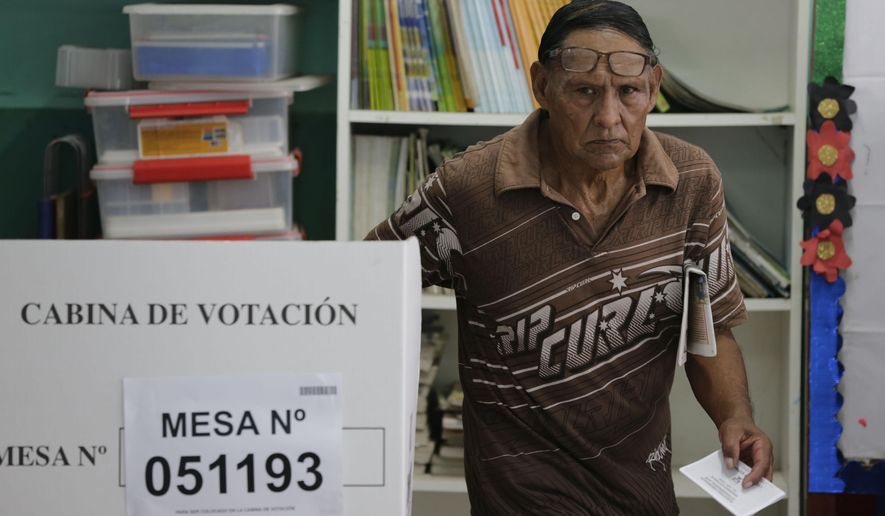LIMA, Peru (AP) - Peruvian President Martín Vizcarra urged citizens to “show love” for their country and vote Sunday for a new slate of legislators nearly four months after his polemical decision to dissolve Congress.
The South American nation roiled by entrenched corruption is grappling with widespread voter apathy that could pose a challenge for Vizcarra’s bid to transform the legislature.
Polling leading up to the vote indicated that fewer than one in three voters had decided on a candidate, with nearly half still undecided and one in five planning to cast a protest ballot by selecting none of the more than 2,300 candidates in the running.
“One way to show our love for the homeland is strengthening our democracy,” Vizcarra told journalists as he cast his ballot. “And how do we do that? Showing up today to vote.”
Vizcarra stunned the nation in late September when he invoked seldom-used executive powers to shut down the opposition-controlled legislature he accused of shielding crooked politicians and blocking his anti-corruption drive.
The decision plunged Peru into its deepest constitutional crisis in nearly three decades, with anti-Vizcarra lawmakers accusing him of overstepping the law and briefly swearing into office their own president. Nonetheless, the move was widely popular with the public and was upheld by the Constitutional Tribunal.
The president is hoping the new Congress will break his stalemate with the legislature.
The 130 new lawmakers will only hold office until scheduled presidential and congressional elections in 2021 and will not be allowed to run in next year’s vote.
Data from international polling firm Ipsos indicated that none of the 22 competing parties was likely to get more than 10 percent of the vote, suggesting the likelihood of a fragmented legislature.
“No one party has been able to capitalize on the wave of anti-establishment sentiment,” said Abhijit Surya, Peru analyst with The Economist Intelligence Unit.
Vizcarra rose to power in 2018 after President Pedro Pablo Kuczynski resigned following months of turmoil related to previously undisclosed financial ties to Odebrecht, the Brazilian construction giant that has admitted to paying nearly $800 million in bribes across 12 countries in exchange for lucrative public works contracts. Peru’s past four presidents are all under investigation, as is opposition leader Keiko Fujimori, whose party previously dominated Congress.
Adriana Urrutia, director of the political science program at Antonio Ruiz de Montoya University in Lima, said Peruvians are now more inclined to vote for individual candidates than parties the public has lost confidence in.
“That makes building representative institutions difficult,” she said.
Many voters were skeptical that even with a new Congress much will change.
Victor Salazar said he was doubtful that incoming legislators given less than two years in office will have enough time to pass through meaningful anti-corruption reforms.
“I don’t have a lot of hope, to tell the truth,” he said.
Others were putting their hope in electing candidates new to politics and free of the corruption-tarnished history of many past lawmakers.
“The hope of the Peruvian people is to have a different Congress,” said Jacinto Arana, an evangelical pastor. “One that can work together for the good of the country.”
Voting is required in Peru, with a $26 fine for those who don’t participate - about 10% of the monthly minimum wage.
_
Associated Press journalists Cesar Olmos and Cesar Barreto contributed to this report. Armario reported from Bogota, Colombia.




Please read our comment policy before commenting.